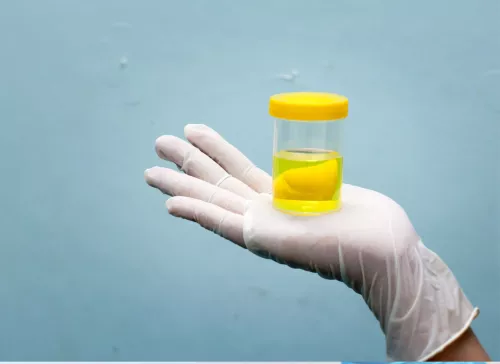
Blog post
Answering your #1 question: How your pee can reveal if your kidneys are not working well

Immature as it may be, it is sometimes hard to resist giggling a little at a bathroom humor joke. However, when something is off in the bathroom, it is most likely not a laughing matter. In some cases, it can even be a sign of kidney disease or kidney failure.
Urine (pee) is a product of your kidneys' hard work. Your kidneys filter all the blood in your body and remove extra fluid and waste products that your body does not need. That fluid with waste products is what makes up your urine.
Although kidney disease often has no symptoms, your urine can sometimes reveal that your kidneys are not working as well as they should. Some of these signs are ones you can notice, but in many cases, they can only be detected by a urine test.
Here are the signs from your urine of a kidney problem that you may notice:
Your urine looks off
There are some clues you can see in your urine that may signal that something is wrong with your kidneys.
If your urine is frothy or foamy, it can indicate that something is wrong with your kidneys. Although normal urine can be bubbly from time to time (the speed at which your pee comes out can create bubbles that then disappear), it is concerning if your urine is frothy or foamy (white bubbles that stay in the toilet even after you flush). If you are consistently having frothy or foamy urine it may mean you have more protein in your urine than normal. This can be a sign of kidney failure or other kidney problems like IgA nephropathy or nephrotic syndrome.
Color
Normal urine is either yellow or clear in color. If your urine is dark yellow, brown, pink or red, it may mean something is wrong. Often, discolored urine means there is blood in your urine (blood can make your pee look brown, pink or red), which may signal you have a kidney infection, urinary tract infection (UTI) or kidney stone. Or it can be a sign of chronic kidney disease, including rare diseases like IgA nephropathy.
Your urine smells off
Although urine itself is not necessarily a pleasant smell, if your urine smells worse or different than usual, it can indicate something is wrong. Bad-smelling pee can be a sign of a kidney infection, a UTI or a kidney stone.
Your urine is coming at a different rate than usual
On average, a healthy person will pee up to seven times in a 24-hour period. This can vary depending on a number of factors, including age, how much you drink in a day and what medicine you use. However, if you notice a difference in how often you are peeing – either more frequently or less frequently than usual – it can mean that something is wrong with your kidneys.
Unfortunately, there is only so much your urine can tell you from simply looking at (or smelling) it. To find out if your urine is showing signs of kidney problems, you will need to do a urine test. It may surprise you to learn that there are several different kinds of urine tests, including a urine albumin-to-creatinine ratio (UACR) test, a 24-hour urine test and a nephrin test.
Here are the signs of a kidney problem that a urine test may show:
Protein in your urine
When your kidneys are damaged, one of the earliest signs can be protein in your urine. Healthy kidneys remove extra fluid and waste from your blood, but they do not remove proteins and other important nutrients that your body needs. But when your kidneys are damaged, they may let this protein leak into your urine. This causes high levels of protein in your urine. While foamy urine is a signal that there is too much protein in your urine, sometimes you cannot know that you have too much protein without a urine test. Detecting protein in urine through a urine test can help you find kidney disease early, before the damage to your kidneys is severe. By repeating urine tests as time passes, your doctor can also see if the damage to your kidneys is getting worse.
Blood in urine
As discussed above, blood in your urine can be a sign of a problem with your kidneys. If your pee is brown, pink or red, you can easily tell that there is blood in it. However, sometimes, you may not know you have blood in your urine until you have a urine test. A urine test may also find white blood cells, which can be a sign of an infection in your kidneys or another part of your urinary tract. In some cases, it can also indicate a chronic kidney disease like IgA nephropathy.
Glucose
Glucose is a type of sugar your body gets from the food you eat and uses to create energy. If a urine test detects glucose in your urine, it may be a sign that your glucose levels are too high and that your body is not producing enough of the hormone insulin to keep them at the right level. This may mean you have diabetes, the leading cause of kidney failure.
Bacteria
A urine test may reveal bacteria in your urine, which is a sign of an infection somewhere in your urinary tract – which includes your kidneys.
Crystals
Your kidneys remove waste like extra salt, water, potassium, acid and nitrogen from your blood. Sometimes, though, there can be too many of these substances in the blood and your kidneys cannot filter it all out. When these substances build up, they can form crystals in your kidneys, and these crystals can attract one another to form a solid object called a kidney stone. Kidney stones vary in size and can be as large as a golf ball – and clearly visible to the naked eye – or as small as a grain of sand. A urine test can help see those small crystals and help you take steps to prevent those crystals becoming larger and harder to pass.
Finding and treating kidney disease early can help you slow or stop damage to your kidneys. Ask your doctor about getting a urine test to check for kidney disease.
So, the next time you find yourself needing a bathroom break, just remember that your pee may be trying to tell you something about your kidneys.
Disclaimer: The information provided here is not intended to replace professional medical advice, diagnosis or treatment. If you are concerned about your urine and/or your kidney health, be sure to consult with a doctor or health care professional.

